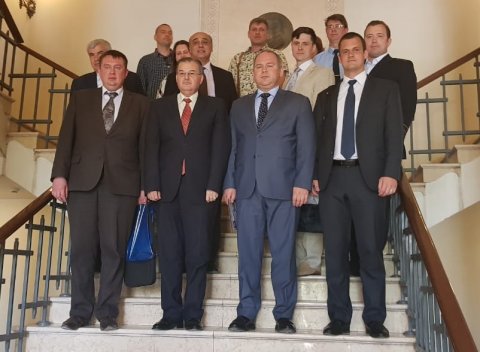Government of the Russian Federation decided to expand quota limit at Russian universities for applicants from Syrian Arab Republic up to 500 people in the academic year 2019-2020. In frameworks of cooperation with Rossotrudnichestvo, on May 23rd through 30th in Damask, Russian-Syrian commission carried out a campaign for selection of students who are to take part in recovery of Syria in the post-war period after finishing their education in Russia. The commission included representatives of Russia’s leading universities, one of which was South Ural State University. Analysis expert of the Rankings Promotion Department form South Ural State University’s International Affairs Division, Mikhail Rukhtin, told us about admission tests for future specialists.

— Why the decision to expand quota limit for students from SAR was made?
— It is connected with the fact that peace slowly returns to Syria, and it is necessary to recover the Republic. There live many alumni of Soviet’s and Russian universities who didn’t leave the country during military actions. Government of the Russian Federation does not just help with military equipment and forces; it also aspires to provide assistance in recovering economics by training young specialists intended for Syria’s needs.
— What kind of specialists does Syria need in order to recover in the post-war period?
— Syria needs Russian language teachers because Russian equipment is used there, as well as because Russian enterprises such as Gazprom and Rosneft are going to open their branch companies there. Besides, the Republic needs engineers, road builders, economists, and many other specialists who are normally in demand.
— How did the campaign for selecting students who are to study at Russian universities go?
— The first stage of selection was organized by the Ministry of Education of Syria; they reviewed graduation certificates of applicants, and after that representatives of Rossotrudnichestvo and Russian universities got involved. The joint commission carried out interviews. It was important to reveal civic stance of applicants, their attitude to military service. As we know, conscription age in Syria, in regard with military actions, is under 50; if a person evades military service, it means that he is being oppositional. Also, it was important to understand what students are going to do after finishing their study. The future specialists should not use Russia as a bridge to Europe, because they are obliged to return to their country in order to contribute into its recovery. They are to become the first students of such big number of alumni, and like an ice-breaker they will lay the path to peaceful life in Syria.
— What agreements on cooperation were signed between SUSU and Syrian universities?
— Meetings were organized with representatives of three Syrian universities, featuring Rector of the University of Damascus. It is necessary to determine areas in which we could cooperate. It should be noted that they are willing to cooperate.
— What does participation in selection and training of students from Syria mean for SUSU?
— Participation of SUSU in training of Syrian students in the frameworks of cooperation with Rossotrudnichestvo allows the university to obtain additional quotas provided by the Government of the Russian Federation and increase the number of students of state-funded mode of study. Moreover, working in the joint commission and attracting international students contributes to popularization of South Ural State University. Last year, the university didn’t take part in selection of applicants. At the moment, SUSU selected 19 applicants to study at the university in the next year; ten of them will be studying at the Faculty of pre-university training; the others will get training in various specialties.
We should note that representatives of Rossotrudnichestvo in Lebanon invited specialists from Russia’s higher education institutions to Damascus. Representatives of the following six universities took part in meetings with the Minister of Higher Education of the SAR, Atef Al-Naddaf: South Ural State University, Peoples’ Friendship University of Russia, Don State Technical University, Saint-Petersburg Mining University, North-Caucasus Federal University, and Ural Federal University. In the course of meetings, parties discussed establishment of cooperation between universities of Syrian Arab Republic and Russian universities, as well as selection of students for studying in the Russian Federation.




